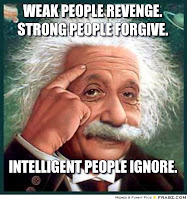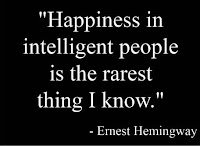"So convenient a thing it is to be a reasonable creature, since it enables one to find or make a reason for everything one has a mind to do."
-Benjamin Franklin
I have always admired those people whom the society labeled as "intelligent"; on the way they think, the way they make sense of things, their reactions to certain issues, their interesting humor, and the way they brought themselves to the society itself. They are respected; people want to learn things from them. However, based on what I have observed from them, it is not their intelligence (by "intelligence" I am referring to their capacity to deal with abstract ideas, as it is usually understood by the general public) that makes the difference, but instead it is their character; their characteristic moral attitudes, values, and social attitudes. Of course this doesn't mean their capacity to think and reason about ideas does not matter. It is a prerequisite, but it is far from enough. These people won't be able to deal with abstract ideas without their willingness to engage in such activity in the first place. It is more of a matter of their beliefs about what is good and what is bad, and what is important or not important; engaging in intellectual thoughts are considered good and important for them. This moral attitude drives these people to inquire knowledge, open to new experiences that may challenge their thoughts, reflect, and learn. In other words, it is all a matter of choice. They can choose to change their attitude and not to care; they can choose to become somebody else; anytime, anywhere (as long as they have the chance to do so). After all, even engaging in intellectual matter requires energy; and it is also a matter of choice for people on what to do with the time and energy they have.
Social attitudes are also of an important matter. Humans are social creatures, and what these "intelligent" people think about the social world influence every aspect of personal attributes they have. Do they have the willingness to share their thoughts with other people, or just keep them to themselves? A willingness to interact with other people regarding their own thoughts opens the door to new ideas that may challenge their own; thus, making sure if their ideas make sense to other people. These new ideas may point out flaws in the way they think, validate it, or giving new insights to the people who receive them. Regarding this though, I think one has to be really careful in choosing the people who he or she is willing to engage in a conversation related to their thoughts; for not all people are willing to do so as well.

I think all these intelligent people have one important quality that makes them survive as they are: a big heart. They are prepared to take all criticisms and perhaps personal attacks from the society for their ideas. Instead of bringing these clever people down, these attacks either 1) give them the clue that it is pointless to talk about such things to these people, therefore it is a sign to be silent instead, if the goal is to get along with them, or 2) another knowledge about what other people think or react about a certain matter; this knowledge can be used to evaluate their own thoughts, or to understand the characteristics of the people who cannot take their ideas. I wanted to say that they have a sense of self-worth and confidence that they do not let others let them down.
Some people have bad experiences in their social life (e.g. victim of bullying, abuse, etc), and those bad experiences surely modified their social attitudes if these experiences happen when they do not have full control of themselves (when they're still a child; because normally human brains become fully matured at the age of 18). A damaged sense of self makes it difficult for these people to cope with criticisms and personal attacks, and therefore they need to learn to know, love, and respect themselves at first. From this, comes the strength to defend their own self; a strength that simply comes from the belief that "I am a worthy individual, I have the potential, and I can be in this world." The world is never kind enough to let one realize all one's potentials, and even it is so, one can still make a difference. That is why I believe that no matter who we are, no matter what we do, one has its place in this world for a good reason. Regarding this, sometimes the beliefs about God, heaven, and hell for no reason at all help people to survive this world. Still, it is ideal to really make sense on such beliefs; to reason about them and go deep under them. These beliefs are not just illusion by the way; they are a real phenomenon. I guess, it is ideal to never take anything for granted (This is also one characteristic that I have observed from those people who are considered intelligent). Label something stupid when one has made the effort to find out about it and reason about it and found out it is illogical, for sometimes we learn that something is stupid because people or books told us so, with not enough arguments provided. One amazing thing about humans capacity to think and reason is that it even inquires up to the point that the capacity of reason itself is limited:
"The last step of reason is the recognition that there are infinite number of things which are beyond it."
-Blaise Pascal
Yet, one cannot say that because of this "ugly fact" one should give up reasoning. Even if Benjamin Franklin points out how convenient and wonderful it is to have the capacity of reason, he doesn't say it is perfect; the fact that such capacity is limited is simply a fact that one has to take, just as one has to take that he or she was born male/female, that has the ethnicity of minority in the country, or that the earth is not flat.This then, explains another remarkable attitude for those people who are considered intelligent: They are humble. Their intelligence may boost their self-esteem, but they do not think that they are the only ones to have such thing. even if they are the only ones; for another fact is that every human has its own strengths and weaknesses, that is why they need each other. They embrace all of these facts, no matter how good and ugly they are, just as they embrace their own selves.
Finally, I am not saying that such "intelligent" people will always be "intelligent", for as humans we are life-long learners, especially because we are so small and the world is so big. Such people can break down sometimes and may show some inappropriate or unintelligent behaviors, but they will become the way they are used to be known once they embrace the experiences that make them broken. Come to think of it, I think being aware of this might also be an important attribute for them to say the way they are. But well, some things are easier said than done. There are those experiences in life that we (somehow) just have to go through; those that perhaps we don't have the capacity or energy to think about before, or maybe we are just too stubborn and curious that we purposely place ourselves on them (well, for the latter I think as long as we take responsibilities of what we chose to do it is all right). Regarding this, I personally think that this what makes life interesting. Imagine if we had full control on our lives; maybe the word "surprise", "curiosity", and perhaps "fun" wouldn't exist.

Note: For image source see image properties








